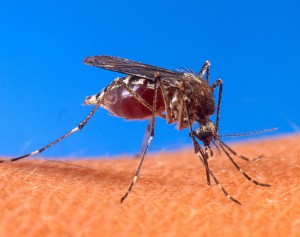There may be another way to protect yourself against mosquitoes. A new study in the Journal of Experimental Biology used mosquitoes (Aedes aegypti) in varying environments of carbon dioxide. Mosquitoes use carbon dioxide to locate a snack (i.e., your ankle). But what happens if carbon dioxide is already in the environment? Mosquitoes presumably may then have difficulty locating their blood host.
[The mosquito detected carbon dioxide from this host in order to find its meal.]
Researchers at the Swedish University of Agricultural Sciences wanted to see just how affected these mosquitoes would be by extra carbon dioxide in their hunting environment. They used a wind tunnel in which they could control background carbon dioxide levels as well as a “stimulus concentration” which acted as a host for the mosquitoes. Take-off time and time to source contact were measured. Take-off time refers to how long the mosquitoes take to decide that a host is nearby. Time to source contact refers to how long the mosquitoes take to locate this host.
When the mosquitoes were tested in an environment filled with carbon dioxide, they took more time to take-off. Not only this, but these mosquitoes also had a more difficult time detecting the stimulus concentration (fake host), even when this concentration was increased. In terms of finding this stimulus, whenever the wind tunnel had the least amount of carbon dioxide, the mosquitoes were able to find the source quicker.
To confirm these behavioral results, the study also looked at the electrical activity in olfactory-receptor neurons (also known as: nerves that detect smells) that were specific for carbon dioxide detection. The stimulation of these nerves correlated with the mosquitoes’ apparent difficulty detecting hosts in environments with high carbon dioxide levels already present. This implies that these nerves are experiencing a masking effect. So, if you’re looking for the best mosquito repellant on the market, search for a tank of carbon dioxide to fill your surrounding environment.
The researchers actually concluded this may not be necessary, though. With rising atmospheric carbon dioxide levels in our environment, mosquitoes may have a tough time adapting to these constantly rising levels. This is big news, and it begs the question: will mosquitoes stick around in our changing climate? More research is necessary to make conclusions about mosquito adaptability in terms of rising levels of carbon dioxide, however. To find out more about this phenomenon, find this article in the most recent issue of the Journal of Experimental Biology.
Majeed, S., Hill, S. R., & Ignell, R. (2014). Impact of elevated CO2 background levels on the host-seeking behavior of Aedes aegypti. Journal of Experimental Biology, 217, 598-604.



Sensory overload. Well if you shine a bright light in a monkey’s eyes I will make a scientific bet that it will be difficult for the animal to find food. But eventually it will, as other sensory systems will take the lead. Mosquitos aren’t going anywhere anytime soon.
Let’s hope they don’t start marketing CO2 as an insect repellent!